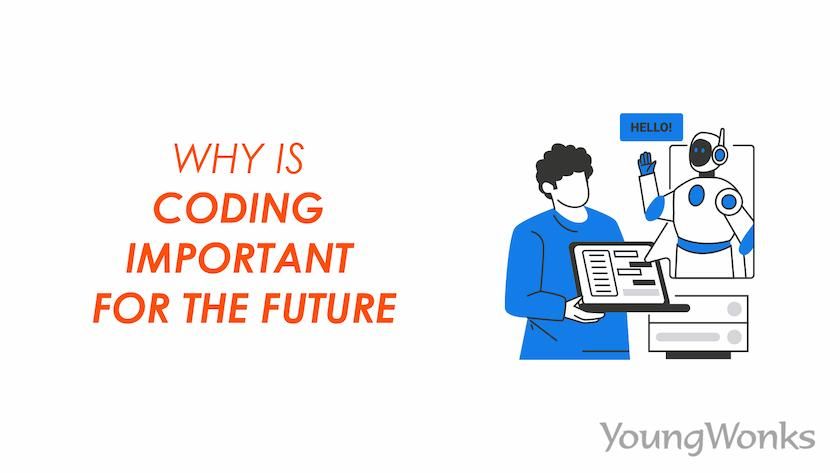Nov 04, 2024 By Team YoungWonks *
The Growing Importance of Coding
Technology is advancing at an unprecedented pace, and businesses across all industries rely on programmers to build, maintain, and improve digital systems. With the rise of automation, artificial intelligence, and big data, knowing how to write code is an advantage that can unlock countless job opportunities. Whether in healthcare, cybersecurity, or data science, coding is at the heart of innovation.
Moreover, coding bridges the gap between human ideas and digital execution. It enables individuals to transform their creativity into functional applications, enhancing various aspects of our daily lives. Whether it's creating a new social media platform, designing an interactive website, or developing intelligent software for businesses, coding acts as a fundamental pillar in modern technology. As industries continue to evolve, coding will play an even greater role in streamlining processes and improving efficiency.
Coding: A Gateway to Numerous Career Paths
The demand for skilled coders is higher than ever. From web development to software engineering, there are numerous career paths that require expertise in computer programming. Companies look for professionals with knowledge of programming languages like python, java, and JavaScript to develop applications, analyze data, and improve user experiences.
Coding Careers in High Demand
Coding opens doors to a wide range of career opportunities in various industries. The demand for skilled professionals is soaring, with tech-driven companies seeking individuals with expertise in computer programming and software development. Here are some of the top career paths for those with coding skills:
- Software Development: Creating applications and systems that run on various devices. Software developers work with programming languages like python, java, and javascript to develop everything from mobile apps to enterprise-level software solutions.
- Web Development: Building interactive and functional websites. Front-end and back-end developers ensure smooth user experiences, making web development a vital industry.
- Machine Learning & Artificial Intelligence: Training systems to learn from data and make decisions. AI specialists use algorithms and big data to create intelligent software that powers everything from voice assistants to predictive analytics.
- Data Analysis & Data Science: Examining large data sets to uncover trends and insights. Companies rely on data scientists to interpret complex information and make data-driven decisions.
- Cybersecurity: Protecting digital systems from cyber threats. Cybersecurity experts safeguard sensitive information, making this an essential field in the modern digital landscape.
- Information Technology: Managing and troubleshooting computer systems to ensure businesses run efficiently.
With the increasing reliance on technology, coding-related careers are expected to grow exponentially, making it a lucrative career path for learners who want to level up their skill set.
The Role of Coding in Problem-Solving
One of the biggest benefits of coding is that it enhances problem-solving skills. Writing code requires logical thinking, creativity, and the ability to break down complex problems into smaller, manageable tasks. Coding also helps improve critical thinking, as developers must analyze and troubleshoot issues effectively.
How Coding Helps in Real-World Applications
Coding plays a crucial role in many industries, transforming the way we work and live. Here are some significant real-world applications where coding is making a difference:
- Healthcare: AI-driven diagnoses, medical record systems, and telemedicine platforms are transforming patient care. From automating administrative tasks to improving diagnosis accuracy with machine learning, coding plays a vital role in modern medicine. Professionals with coding expertise can work in healthcare technology, developing medical software, optimizing hospital systems, and enhancing real-time data processing for better patient outcomes. The demand for coders in healthcare continues to rise, offering promising job opportunities in a rapidly evolving industry.
- Social Media: Platforms like Facebook, Instagram, and Twitter rely on complex algorithms to recommend content, detect trends, and improve user experience. Coding ensures these platforms remain responsive, secure, and engaging, making social media an ever-growing industry with a demand for skilled programmers in big data and AI.
- Startups: Many startups rely on technology and coding to develop innovative products and services. Entrepreneurs with coding knowledge can build their own applications, websites, and platforms without relying on external developers. This helps them cut costs, iterate quickly, and bring their ideas to market faster.
- Finance: The financial sector depends heavily on technology, with automated trading, fraud detection, and banking applications being powered by coding. Computer programming is essential in creating secure transactions, improving risk analysis, and implementing AI-driven financial advisory systems. Coding professionals in finance can expect lucrative job opportunities as digital banking expands globally.
- E-commerce: Online shopping platforms like Amazon and eBay use computer systems to manage transactions, personalize user recommendations, and streamline logistics. Coding enables seamless user experiences, allowing businesses to thrive in the competitive online marketplace. E-commerce developers focus on building scalable and secure platforms that handle millions of transactions daily.
As the demand for automation and digital solutions continues to rise, coding will play an even bigger role in our everyday lives, offering vast career opportunities for those who develop strong coding skills and expertise in programming languages.
Coding Bootcamps: A Fast Track to Success
For those looking to enter the tech world quickly, coding bootcamps provide intensive training in computer coding. These short-term programs focus on hands-on experience with writing code, debugging, and building projects. They are a great way for beginners to get started in the job market without a traditional computer science degree. Many bootcamps also offer job placement assistance, networking opportunities, and mentorship from industry professionals. Whether you're transitioning careers or looking to enhance your skill set, coding bootcamps provide a structured and efficient path into the tech industry
The Importance of Learning to Code Early
Teaching children and beginners how to code through platforms like Scratch helps develop their logical reasoning and analytical skills from a young age. Learning to write lines of code early builds confidence and prepares them for future careers in technology. Even those learning coding as a second language find it similar to learning English, as it involves syntax, structure, and logic.
Final Thoughts
With technology continuously evolving, coding jobs will remain crucial in shaping the future. Whether you want to build websites, develop AI systems, or analyze data, coding is a skill that offers unlimited potential. Learning to code is not just about understanding technology—it’s about being prepared for a world where digital solutions drive progress. So, if you're thinking about learning to code, now is the time to start! Equip yourself with coding skills, explore different programming languages, and unlock new opportunities in the world of software development and beyond.
*Contributors: Written and Edited by Disha N, Lead image by Shivendra Singh

